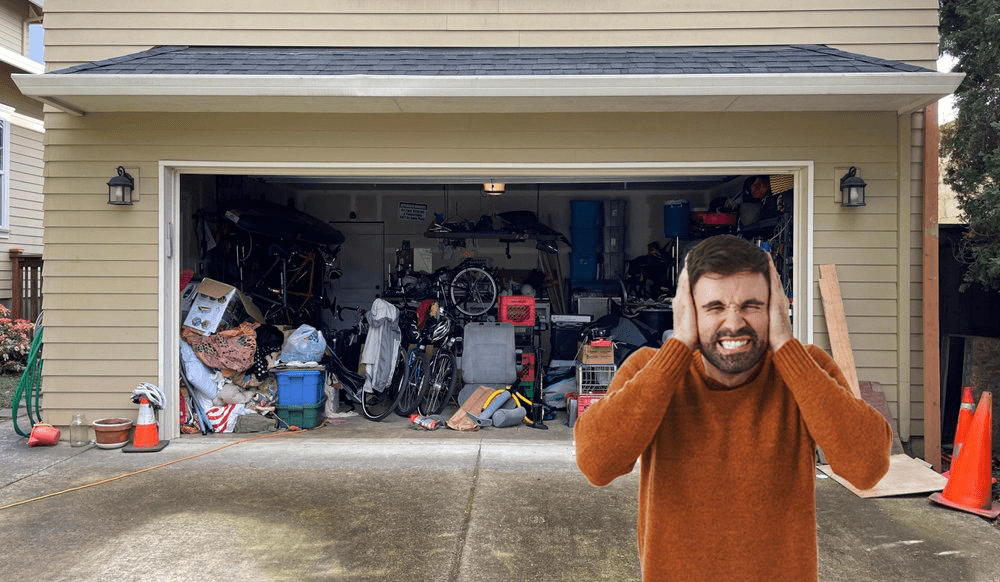Why Is My Garage Door So Loud When Opening? A noisy garage door can be a nuisance, especially if you live in a close-knit neighborhood. It can also be a sign of a problem that needs to be addressed. In this article, we’ll explore the most common causes of noisy garage doors and how to fix them.

What causes a noisy garage door?
There are a number of things that can cause my garage door so loud when opening. Some of the most common causes include:
- Worn or damaged tracks: The tracks that guide the garage door up and down are essential for smooth operation. Worn or damaged tracks may result in the door grinding or squealing as it moves.
Examples of worn or damaged tracks:
- Tracks that are rusty or corroded
- Tracks that are bent or misaligned
- Tracks that have gaps or holes
How to fix worn or damaged tracks:
- If the tracks have only minor wear, you can enhance the noise level by cleaning and lubricating them.
- Replace severely worn or damaged tracks to address the issue.
- Sticking or binding hinges: The hinges that connect the garage door to the frame are also important for smooth operation. If the hinges are sticking or binding, they can cause the door to make a loud noise as it opens or closes.
Examples of sticking or binding hinges:
- Hinges that are rusty or corroded
- Hinges that are bent or misaligned
- Hinges that are not lubricated properly
How to fix sticking or binding hinges:
- If the hinges are only slightly sticking or binding, you may be able to clean and lubricate them to improve the noise level.
- If the hinges are severely sticking or binding, you may need to replace them.
- Loose or damaged springs: The springs that provide the power for the garage door are another important component. If the springs are loose or damaged, they can cause the door to make a loud noise as it opens or closes.
Examples of loose or damaged springs:
- Springs that are rusty or corroded
- Springs that are broken or cracked
- Springs that are not aligned properly
How to fix loose or damaged springs:
- If the springs are only slightly loose or damaged, you may be able to tighten or replace them yourself.
- If the springs are severely loose or damaged, you should have them repaired or replaced by a professional.
- Misaligned or damaged rollers: The rollers that guide the garage door along the tracks are also important for smooth operation. If the rollers are misaligned or damaged, they can cause the door to make a loud noise as it moves.
Examples of misaligned or damaged rollers:
- Rollers that are not aligned properly
- Rollers that are bent or misshapen
- Rollers that are damaged or worn
How to fix misaligned or damaged rollers:
- If the rollers are only slightly misaligned or damaged, you may be able to adjust them yourself.
- If the rollers are severely misaligned or damaged, you may need to replace them.
- Debris or obstructions: Debris or obstructions on the tracks or under the garage door can also cause noise.
Examples of debris or obstructions:
- Objects that are stuck in the tracks
- Dirt, leaves, or other debris that has accumulated under the garage door
How to fix debris or obstructions:
- Remove any objects that are stuck in the tracks.
- Sweep or vacuum any debris that has accumulated under the garage door.
Preventing noisy garage doors
You can help prevent your garage door from becoming noisy by following these tips:
- Inspect your garage door regularly for signs of wear or damage.
- Lubricate the hinges and rollers regularly.
- Avoid overloading your garage door.
- Avoid attempting to open or close your stuck garage door.
By following these tips, you can help keep your garage door running smoothly and quietly.
Read too: How Many Turns On A 7Ft Garage Door Spring
Additional tips
In addition to the tips listed above, there are a few other things you can do to help reduce noise from your garage door:
- Consider installing a quieter garage door opener.
- Add weatherstripping to the garage door to help seal out drafts.
- Install a garage door silencer.



Leave a Reply